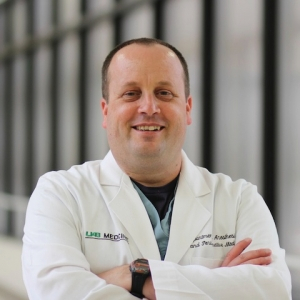Program Mission:
The goal of this training program is to assist the research fellow in developing the necessary expertise for a successful career as an academic physician-scientist. While we invite our potential research fellows to follow any of a variety of research paths, our major foci are in the following areas of research: neurobiology of pain, organ injury and repair, data science/predictive analytics, and health outcomes research.
Program Overview:
The Research Fellowship in the Department of Anesthesiology and Perioperative Medicine consists of twelve to twenty-four months of post-graduate training after successful completion of an accredited residency program in Anesthesiology. Fellows are encouraged to have a Foundation for Anesthesia Education and Research (FAER) Research Fellowship Grant, a NIH K grant, or be appointed to a T32 grant. They spend 80% of their time pursuing their research interests and 20% in clinical service. The Research Fellowship is tethered to a part-time faculty appointment as a clinical instructor in the Department of Anesthesiology and Perioperative Medicine at the University of Alabama at Birmingham.
The primary goal of the Research Fellowship training program is to develop expertise in one of the following areas of research:
- Neurobiology of Pain: Mechanisms by which pain signals are initiated, transduced and modulated in sensory pathways (e.g. interstitial cystitis; trigeminal pain)
- Organ Injury and Repair: Mechanisms by which environmental insults (such as pathogens, toxic gases), trauma, organ transplantation and blood transfusions result in end-organ injuries
- Data Science/Predictive Analytics: Predicting outcomes in patient care with artificial intelligence or machine learning, creation of generative AI platforms for health care, and wave form analysis
- Health Outcome Research: Many areas could be considered as we are an Multicenter Perioperative Outcomes Group (MPOG) institution
Fellows usually complete the Systematic Training in Anesthesia Research program and choose a research mentor based on their research interests, but this pathway is not required. Currently, there are twelve faculty members in the Division of Molecular and Translational Biomedicine with active, NIH-funded research programs in the aforementioned areas of research. We also have a data science group, led by Dr. Ryan Melvin, which has a total of 3 data scientists working in the aforementioned areas. There are also a number of active clinical and educational research projects with qualified mentors.
In addition to research and clinical activities, the fellow participates in weekly research conferences and the mentor’s laboratory meetings. They will be asked to present their data monthly. The fellow will also attend didactic courses and/or seminars offered by other departments and the Centers for Clinical and Translational Sciences, such as courses on statistics, publishing, running a laboratory. The ultimate goal of the Research Fellowship is to prepare fellows for a successful career as an academic physician-scientist.
We are committed to providing an outstanding fellowship training experience. Please do not hesitate to contact us if you have additional questions about the program.
Contact
 Brant Wagener, M.D., Ph.D.
Brant Wagener, M.D., Ph.D.
Program Director
About Birmingham
Click here to learn more about The Magic City.